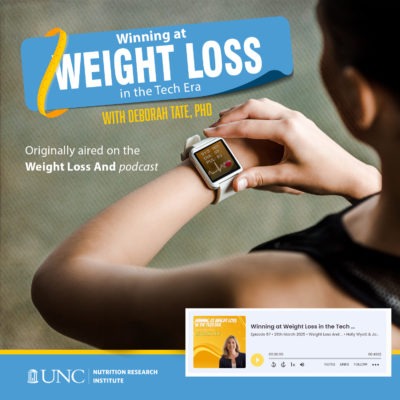Originally aired on the Weight Loss And podcast
In a world filled with smart rings, fitness trackers, and weight loss apps, knowing which digital tools actually work — and how to use them — can feel overwhelming. To help listeners cut through the noise, Weight Loss and… hosts Jim Hill, PhD, and Holly Wyatt, MD, sat down with Deborah Tate, PhD, the interim director at the UNC Nutrition Research Institute, and a leading expert in digital health interventions.
Hosts Dr. Hill, director of the Nutrition Obesity Research Center (NORC) at the University of Alabama at Birmingham, and Dr. Wyatt, a professor in the same center, are nationally recognized leaders in obesity research. Their conversation with Dr. Tate — a core director of the UNC-Chapel Hill NORC — brings together the expertise of two leading NORCs. This rare collaboration offers listeners a well-rounded perspective from three of the nation’s top experts in nutrition and obesity.
Tate has been at the forefront of this field since the early days of internet health tools, and she’s watched the space evolve from simple websites to sophisticated AI-driven platforms. Her key message? Technology can be an effective support for weight management, but only when paired with behavior change, accountability, and personalization.
“The tools are going to help you recognize how you’re doing over time, but you’re going to have good days and bad days. It’s more about having more good days than not over time,” explains Tate in the podcast.
She emphasized that simply accessing health information — like calorie databases or recipe sites — rarely leads to real change on its own. In her earliest research, she found that people were more successful when they received structured guidance and regular follow-ups, even via something as simple as weekly emails, “Information is key, but it’s not sufficient. Structured programs with accountability outperform information alone.”
The group discussed how wearables like fitness trackers or sleep monitors can give users valuable feedback, even if the data isn’t perfectly accurate. Tate reminded listeners that trends over time are often more helpful than day-to-day precision.
One of the most exciting developments is the use of AI tools to offer more personalized, responsive support. In her research, she’s working with Just-In-Time Adaptive Interventions (JITAIs) — tech that delivers messages based on the user’s real-time behavior. They’re even experimenting with AI-driven conversations to better understand user context and improve messaging. “Instead of just sending a static message,” Tate describes, “We’re engaging users in a conversation using AI to learn more about what’s going on in their lives — and respond more effectively.”
She also encouraged listeners to try using ChatGPT for meal planning and calorie estimation: “I just tell it what I have in my fridge, how many calories I want per portion, and it gives me fast, simple meal ideas. It’s really helpful.”
Despite advances in automation, Tate noted that programs with human support — even over the phone or via Zoom — consistently lead to better outcomes than fully automated systems: “Apps with human support lead to significantly better weight loss. It doesn’t have to be in-person — but that connection matters.”
When evaluating apps or devices, Tate advised listeners to look out for red flags, such as quick-fix promises or upsells to supplements. Instead, focus on tools that promote sustainable habits and come from credible sources.
Tate’s insights reveal that while technology offers powerful tools for weight management, its true value lies in how we use it to support lasting behavior change. These digital tools also play a key role in advancing personalization and precision nutrition — helping tailor approaches based on what works for each individual. As we gather more data and learn what makes people unique, clear messaging and personalized support will be essential to turning insights into meaningful, long-term health improvements. Her ongoing work at the UNC Nutrition Research Institute continues to shape how digital tools and behavioral science come together to improve health outcomes.

